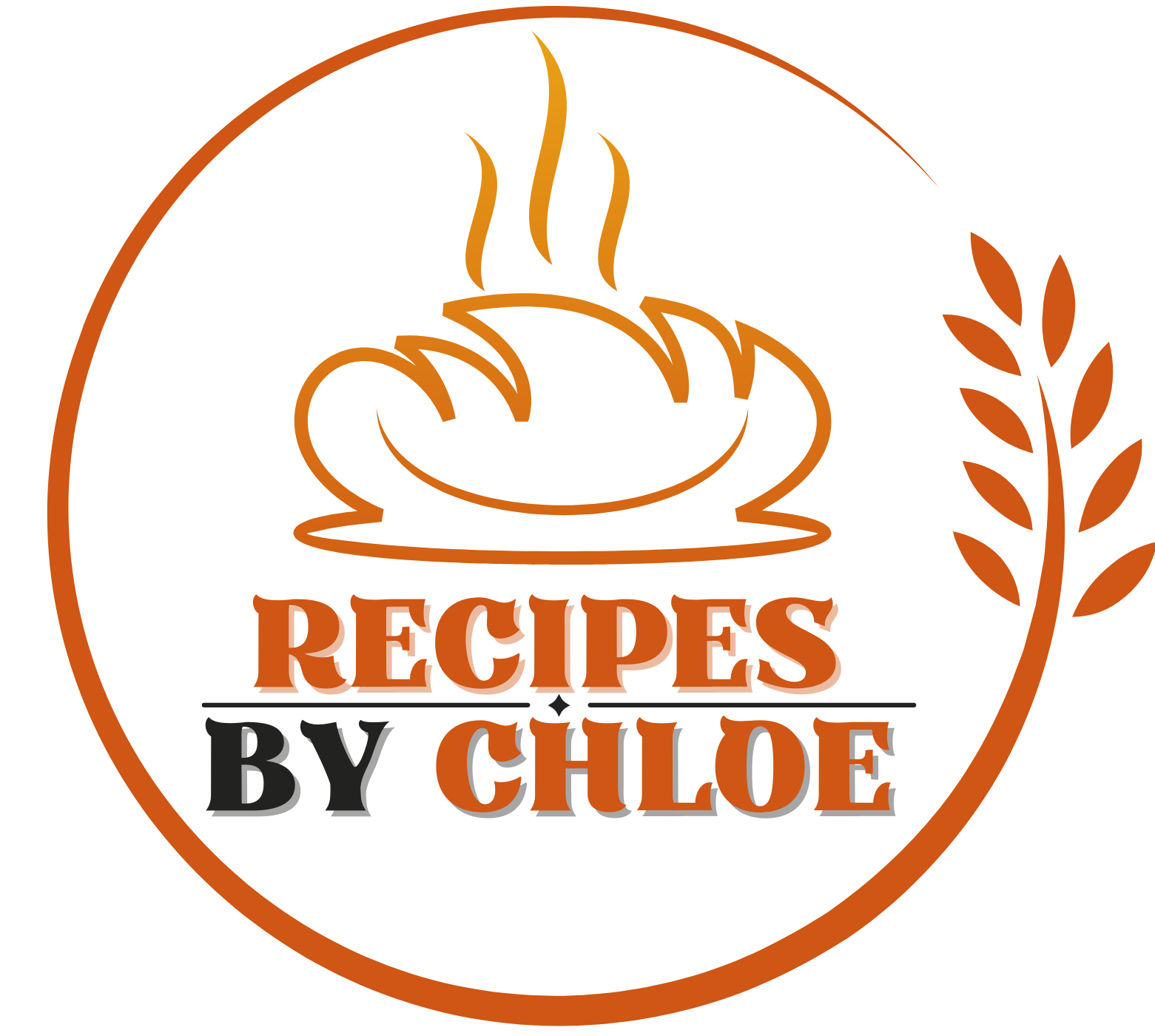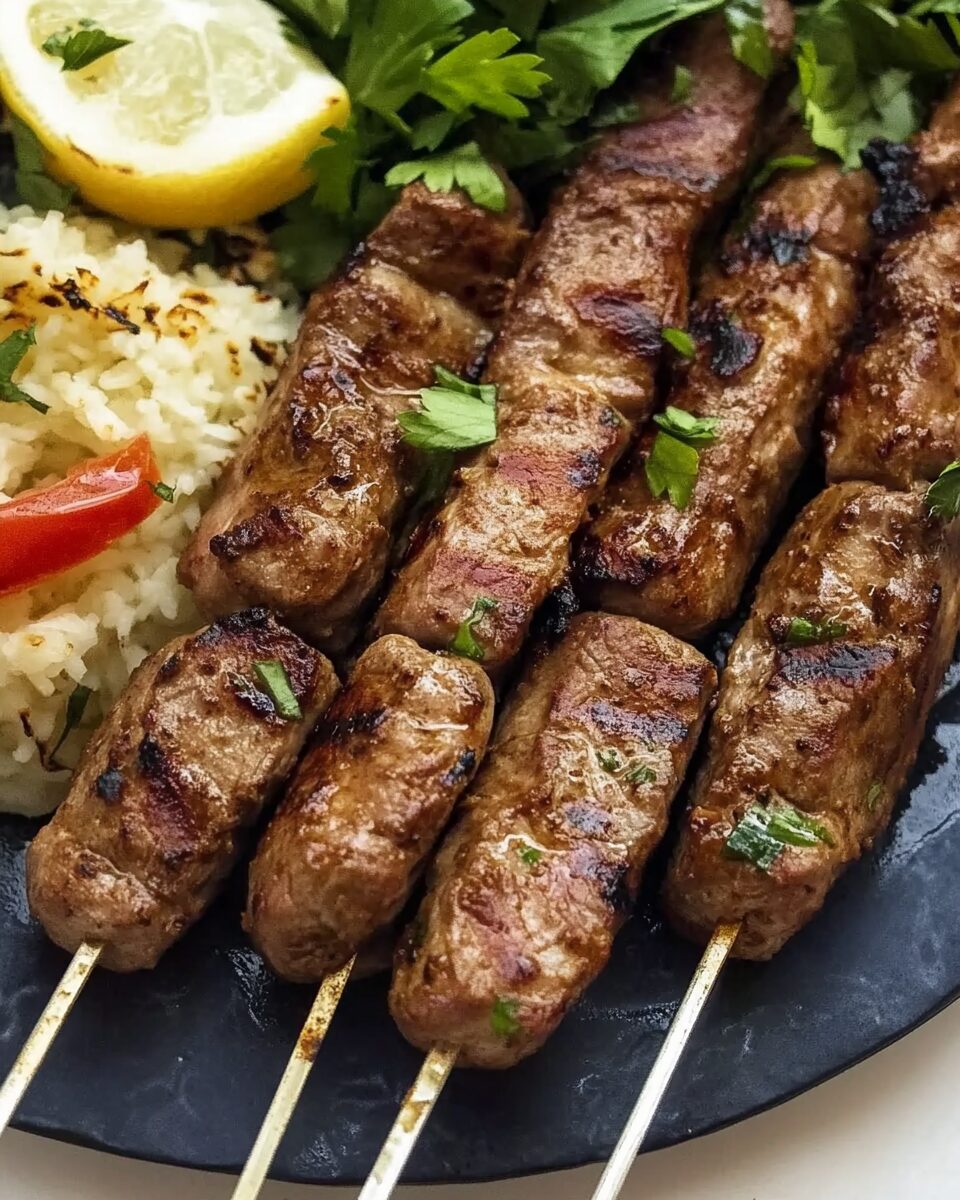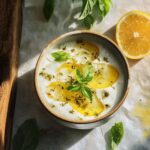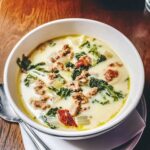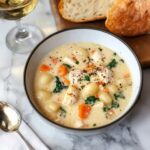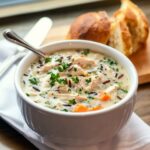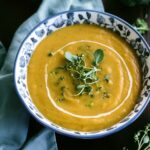Moroccan Lamb Kabobs are a flavorful and aromatic dish that brings the essence of Moroccan cuisine to your table. With tender pieces of lamb marinated in a mixture of spices, garlic, and herbs, then grilled to perfection, these kabobs offer a wonderful blend of savory and slightly smoky flavors. The combination of cumin, coriander, paprika, and cinnamon provides a warm, earthy base, while fresh lemon juice and cilantro brighten up the dish. Perfect for a summer barbecue or a special dinner, these Moroccan Lamb Kabobs are sure to impress your guests with their bold flavors and delicious textures.
Full Recipe:
Ingredients
- 2 pounds lamb shoulder, cut into 1-inch cubes
- 3 tablespoons olive oil
- 2 teaspoons ground cumin
- 2 teaspoons ground coriander
- 1 teaspoon ground paprika
- 1 teaspoon ground cinnamon
- 1/2 teaspoon ground turmeric
- 2 cloves garlic, minced
- 1 tablespoon fresh lemon juice
- 1/4 cup fresh cilantro, chopped
- Salt and pepper to taste
- Skewers (wooden or metal)
Directions
- In a large bowl, combine the olive oil, cumin, coriander, paprika, cinnamon, turmeric, garlic, lemon juice, and chopped cilantro.
- Season the lamb cubes with salt and pepper, then add them to the bowl with the marinade. Toss to coat the lamb evenly, cover, and refrigerate for at least 1 hour (overnight for best results).
- Preheat your grill to medium-high heat. If you’re using wooden skewers, soak them in water for 30 minutes to prevent burning.
- Thread the marinated lamb onto the skewers, ensuring the pieces are evenly spaced.
- Grill the kabobs for about 8-10 minutes, turning occasionally, until the lamb reaches your desired level of doneness (medium-rare to medium is recommended).
- Remove the kabobs from the grill and let them rest for a few minutes before serving. Garnish with extra cilantro and lemon wedges if desired.
Nutrients
Per serving (1 kabob, assuming 6 servings):
- Calories: 270
- Total Fat: 18g
- Saturated Fat: 6g
- Cholesterol: 75mg
- Sodium: 150mg
- Total Carbohydrates: 2g
- Dietary Fiber: 1g
- Sugars: 1g
- Protein: 24g
The Role of Lamb in Moroccan Cuisine
Lamb has a deep-rooted history in Moroccan cuisine. It is one of the most commonly used meats in traditional Moroccan dishes, especially for special occasions and celebrations. The rich and slightly gamey flavor of lamb pairs perfectly with the aromatic spices that are a hallmark of Moroccan cooking. Lamb is often slow-cooked to allow the spices and flavors to penetrate the meat, creating a melt-in-your-mouth experience.
In Morocco, lamb is enjoyed in a variety of forms: stewed in a tagine, grilled on skewers as kebabs, or even roasted. The use of lamb in Moroccan cuisine is not limited to a specific region, but it is particularly popular in the central and southern parts of the country. The combination of lamb with spices like cumin, cinnamon, coriander, and paprika enhances the flavor of the meat, making it a truly luxurious choice for a dish like Moroccan Lamb Kabobs.
These kabobs are typically served at gatherings or special occasions, often accompanied by flatbreads, couscous, or salads. The use of skewers makes it an ideal dish for grilling, allowing the lamb to develop a smoky char while retaining its tenderness and juiciness. The rich spices infuse the meat, making each bite an explosion of flavors.
The Flavor Profile of Moroccan Lamb Kabobs
What makes Moroccan Lamb Kabobs so distinct is the blend of spices used to marinate the meat. Moroccan cuisine is known for its complex and layered flavors, and these kabobs are no exception. The marinade brings together a harmonious mixture of warm spices, citrusy notes, and herbal freshness.
-
Cumin: One of the key spices in Moroccan cooking, cumin brings an earthy, nutty flavor to the dish. It has a slight peppery taste that complements the richness of the lamb.
-
Coriander: Ground coriander adds a citrusy, floral note to the marinade. It balances out the richness of the lamb and the heat of the other spices, creating a refreshing undertone.
-
Paprika: Sweet paprika provides a gentle smoky flavor and a vibrant red color, which adds depth and warmth to the kabobs. It gives the dish an inviting visual appeal and enhances the grilling process by adding a slightly charred note.
-
Cinnamon: In Moroccan cuisine, cinnamon is often used in savory dishes to provide a touch of warmth and sweetness. It helps to create a well-rounded flavor profile, harmonizing with the other spices in the marinade.
-
Turmeric: Though subtle in flavor, turmeric adds a golden color and an earthy undertone to the dish. It contributes to the depth of flavor and has anti-inflammatory properties.
-
Lemon: Fresh lemon juice adds a bright, zesty flavor that cuts through the richness of the lamb. It enhances the overall freshness of the kabobs and adds a touch of acidity to balance the spices.
-
Cilantro: Fresh cilantro brings a refreshing herbaceous quality that ties all the flavors together. It adds a burst of green freshness, making the kabobs taste light and vibrant.
The combination of these spices, along with the freshness of lemon and cilantro, results in a dish that is both bold and well-balanced. The lamb absorbs the spices, creating an aromatic and juicy kabob that is bursting with flavor with every bite.
The Health Benefits of Moroccan Lamb Kabobs
While Moroccan Lamb Kabobs are indulgent in flavor, they also offer several health benefits, making them a great choice for a balanced and nutritious meal. Lamb, when consumed in moderation, provides a rich source of essential nutrients, including protein, iron, zinc, and B vitamins. Here are a few health benefits of lamb and the spices used in this dish:
-
Protein: Lamb is an excellent source of high-quality protein, which is essential for muscle building, tissue repair, and overall health. Protein is also important for maintaining a healthy immune system and supporting enzyme function.
-
Iron: Lamb is a rich source of heme iron, which is easily absorbed by the body. Iron is necessary for the production of red blood cells and helps prevent iron-deficiency anemia.
-
Zinc: Lamb contains significant amounts of zinc, a mineral that supports immune function, wound healing, and cell growth. Zinc also plays a role in maintaining a healthy sense of taste and smell.
-
B Vitamins: Lamb is a good source of B vitamins, particularly B12, which is important for nerve function, DNA synthesis, and the production of red blood cells. The B vitamins in lamb also help to convert food into energy.
-
Spices: Many of the spices used in Moroccan Lamb Kabobs, such as cumin, coriander, and turmeric, have health benefits of their own. Cumin and coriander have antioxidant properties and may help with digestion, while turmeric contains curcumin, which has anti-inflammatory and anti-cancer properties. Cinnamon is also known for its ability to regulate blood sugar and improve heart health.
By pairing lamb with these beneficial spices, Moroccan Lamb Kabobs offer a flavorful and health-conscious option for anyone looking to enjoy a balanced, nutrient-rich meal.
Perfect Pairings for Moroccan Lamb Kabobs
When serving Moroccan Lamb Kabobs, you want to choose side dishes and beverages that complement the bold, aromatic flavors of the lamb. Here are some ideas for sides and drinks that will elevate your meal:
-
Couscous: Couscous is a traditional Moroccan side dish that pairs wonderfully with lamb. Its light and fluffy texture absorbs the juices from the kabobs, making each bite more satisfying. You can serve it plain or with roasted vegetables, dried fruits, and nuts for added flavor.
-
Moroccan Flatbread: Traditional Moroccan flatbread, known as khobz, is perfect for mopping up the flavorful juices from the kabobs. The soft, slightly chewy texture of the bread complements the richness of the lamb and provides a great contrast to the grilled meat.
-
Moroccan Salad: A fresh Moroccan salad made with tomatoes, cucumbers, red onions, and fresh herbs like parsley and mint adds a refreshing element to the meal. The acidity from the salad helps cut through the richness of the lamb, providing a well-balanced meal.
-
Roasted Vegetables: Roasted vegetables, such as carrots, sweet potatoes, or eggplant, make a great accompaniment to the kabobs. The natural sweetness of the roasted vegetables complements the savory lamb and spices, creating a harmonious plate.
-
Yogurt Sauce: A cooling yogurt-based sauce, such as tzatziki, is a perfect dip for the spicy kabobs. The tanginess of the yogurt helps to balance the richness of the lamb, providing a refreshing contrast to the spices.
-
Beverages: A full-bodied red wine, such as Shiraz or Cabernet Sauvignon, pairs well with the rich flavors of the lamb. For a non-alcoholic option, you can serve Moroccan mint tea, which has a refreshing herbal flavor that complements the spices in the kabobs.
Conclusion
Moroccan Lamb Kabobs are a flavorful and aromatic dish that brings the vibrant spices and culinary traditions of Morocco to your table. With tender pieces of lamb marinated in a complex blend of spices, garlic, and lemon, then grilled to perfection, this dish is a true celebration of Moroccan cuisine. The balance of savory, sweet, and smoky flavors makes each bite a memorable experience, while the health benefits of lamb and the spices add to its appeal. Whether served as a main dish at a dinner party, enjoyed as part of a Mediterranean-inspired meal, or prepared for a summer barbecue, Moroccan Lamb Kabobs are sure to impress.
